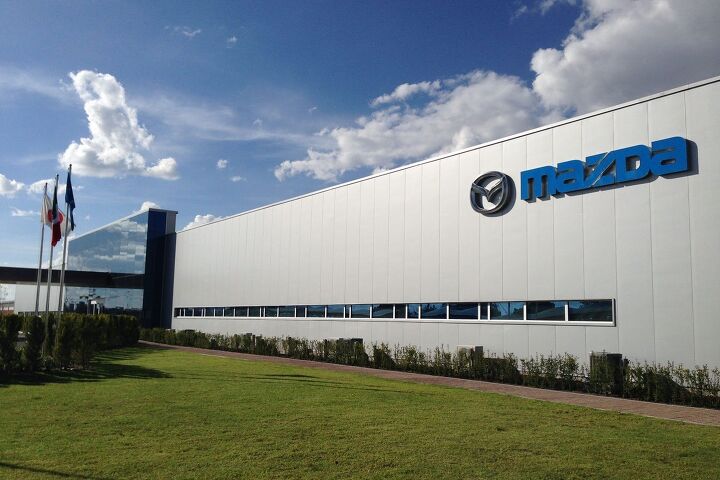TTAC News Round-up: Mazda Doesn't Need No Stinkin' Hybrids, Volkswagen Rebuffs Deadline, and March Looks Like a Winner

“Hybrids? Those things that can’t make up their mind on what they want to be in life? Come on!” – Mazda.
That, Volkswagen floors the accelerator past a deadline, March looks like a boffo month for vehicle sales, Audi dials it back a bit, and getting a Tesla Model 3 depends on whether or not you’re in the club … after the break!
The future is a gas, gas, gas for Mazda
Mazda wants everyone to know that it’s sticking with its first love.
The automaker plans to continue to say “no thanks” to hybrid and EV technology in favor of boosting fuel efficiency from its gasoline powerplants, AutoExpress reports:
Combined with more light-weight technologies in its cars, it will see improvements in fuel economy figures of between 20 and 30% according to Mazda Europe boss, Jeff Guyton.
“I think there’s at least 20-30% better fuel economy by the end of the decade,” said Guyton. “We expect to achieve the [EU’s] 95g/km target without any significant deployment of electrical drive.”
A Mazda3 sold in Japan uses a Prius-sourced hybrid system, but going with an in-house system on its global fleet would mean finding cash it doesn’t have. As such, the maligned hydrocarbon-based fuel continues to find a champion in Mazda.
The fix is not in at Volkswagen
Dropping a gear and mashing the accelerator, Volkswagen is rocketing past a diesel emissions fix deadline set last month by a U.S. District Court judge.
The automaker isn’t expected to have anything new to offer U.S. regulators at today’s federal court hearing, according to Reuters:
Volkswagen and regulators are likely to tell [U.S. District Judge Charles] Breyer they are making good progress toward reaching a deal, but have not reached an agreement, the sources said, adding that a potential deal could still be weeks away.
VW has been in talks with regulators about how to address the issue, including a potential buyback offer for an unknown number of vehicles along with possible financial incentives for owners to get their vehicles repaired.
Volkswagen, which is being sued by the U.S. Justice Department for up to $46 billion, risks further fines with the slow roll-out of its fix. Recently, California’s air regulator said the automaker might be allowed to only partially fix their oldest affected models.
C-R-A-Z-Y sales month predicted
Rumors of the decline in interest in new cars might be exaggerated, if projected March sales numbers are to be believed.
After two so-so months following last December’s scorching hot buyfest, March is shaping up to set a sales record, according to Ward’s Auto. The projected 1.7 million light vehicle sales would not only be a March high water mark, it would also be the industry’s best month since July, 2005:
The forecasted daily sales rate of 61,727 over 27 days is a best-ever March result. This DSR represents a 0.2% improvement from like-2015 (25 days), while total volume for the month would be 8.2% greater than year-ago.
Honda is projected to see the biggest year-over-year sales increase this month, nearing a 10 percent improvement, followed by Fiat Chrysler Automobiles. General Motors and Hyundai/Kia will see the largest sales slip.
Audi gets ahead of itself
Audi is pulling back on the reigns of its U.S. sales goals for 2016, admitting that it might have been a tad too optimistic in its predictions.
The luxury automaker is scaling back its goal from 220,000 units to 210,000 in order to adjust to the evolving market, Automotive News reports:
“They want to match demand and supply and they want us to have ‘one too few’ so we create an environment that helps the dealers get back to the profitability levels that they’ve had in the past,” [Audi U.S. dealer council chairman Ralph] Mauro said.
The problem facing Audi and other high-end automakers is a general slowdown in the luxury car market. Consumers are still buying, but not at the heady growth rate seen in past years.
Want a Tesla Model 3? By another Tesla first
When Tesla founder Elon Musk unveils the electric automaker’s much-anticipated Model 3 (and opens pre-orders) on March 31, first-time Tesla buyers had better make the memory last.
That’s because orders from existing Tesla owners will be pushed to the front of the line, while the nerdlingers who can afford the lower-priced EV but aren’t yet living the Tesla lifestyle will have to wait, Business Insider reports:
If Model 3 development remains on schedule, production won’t begin until late 2017. Deliveries will begin sometime after that, but priority customers will get theirs first.
Who’s a priority customer? People who already own a Tesla. “As a thank you to our current owners, existing customers will get priority in each region” for the Model 3, Tesla says.
“For those who aren’t Tesla owners yet, this means the fastest way to buy a Model 3 is to buy a Model S or Model X.”
Or, to put it another way, the only way to get your hands on that Chevrolet Equinox is to purchase a Cadillac Escalade first.
The Model 3 is meant to be Tesla’s “EV for the masses” — half as pricey as its Model S, but coming on the scene a year after the similarly priced Chevrolet Bolt EV. Don’t be surprised to see General Motors exploit that delivery gap.
[Image: Tesla Model 3, Tesla Motors; Audi, © 2015 Alex Dykes/The Truth About Cars]

More by Steph Willems
Latest Car Reviews
Read moreLatest Product Reviews
Read moreRecent Comments
- Theflyersfan The wheel and tire combo is tragic and the "M Stripe" has to go, but overall, this one is a keeper. Provided the mileage isn't 300,000 and the service records don't read like a horror novel, this could be one of the last (almost) unmodified E34s out there that isn't rotting in a barn. I can see this ad being taken down quickly due to someone taking the chance. Recently had some good finds here. Which means Monday, we'll see a 1999 Honda Civic with falling off body mods from Pep Boys, a rusted fart can, Honda Rot with bad paint, 400,000 miles, and a biohazard interior, all for the unrealistic price of $10,000.
- Theflyersfan Expect a press report about an expansion of VW's Mexican plant any day now. I'm all for worker's rights to get the best (and fair) wages and benefits possible, but didn't VW, and for that matter many of the Asian and European carmaker plants in the south, already have as good of, if not better wages already? This can drive a wedge in those plants and this might be a case of be careful what you wish for.
- Jkross22 When I think about products that I buy that are of the highest quality or are of great value, I have no idea if they are made as a whole or in parts by unionized employees. As a customer, that's really all I care about. When I think about services I receive from unionized and non-unionized employees, it varies from C- to F levels of service. Will unionizing make the cars better or worse?
- Namesakeone I think it's the age old conundrum: Every company (or industry) wants every other one to pay its workers well; well-paid workers make great customers. But nobody wants to pay their own workers well; that would eat into profits. So instead of what Henry Ford (the first) did over a century ago, we will have a lot of companies copying Nike in the 1980s: third-world employees (with a few highly-paid celebrity athlete endorsers) selling overpriced products to upper-middle-class Americans (with a few urban street youths willing to literally kill for that product), until there are no more upper-middle-class Americans left.
- ToolGuy I was challenged by Tim's incisive opinion, but thankfully Jeff's multiple vanilla truisms have set me straight. Or something. 😉







































Comments
Join the conversation
IIRC Mazda has an extended range EV Mazda2 in Japan. Like a Volt, but the gas engine is a rotary, hence lighter & smaller & smoother than a normal ICE lump. Nobody else can do this because nobody else has rotaries. Yes, MPG in gasoline mode will likely suck, but it's a range extender, so it's rarely called on in typical driving. This seems like a smarter path--a way to combine the brand's calling card -- light & lively driving -- with electrical primary power which is, as Howard Hughes once said of jets, the way of the future. The way of the future. The way of the future...
Not having hybrid is not a big deal really, especially if you do not sell a lot of V8 and V6 SUVs to begin with. Now HCCI, I'm not sure if they have the resource to be the first one out, or without huge problems at the beginning.